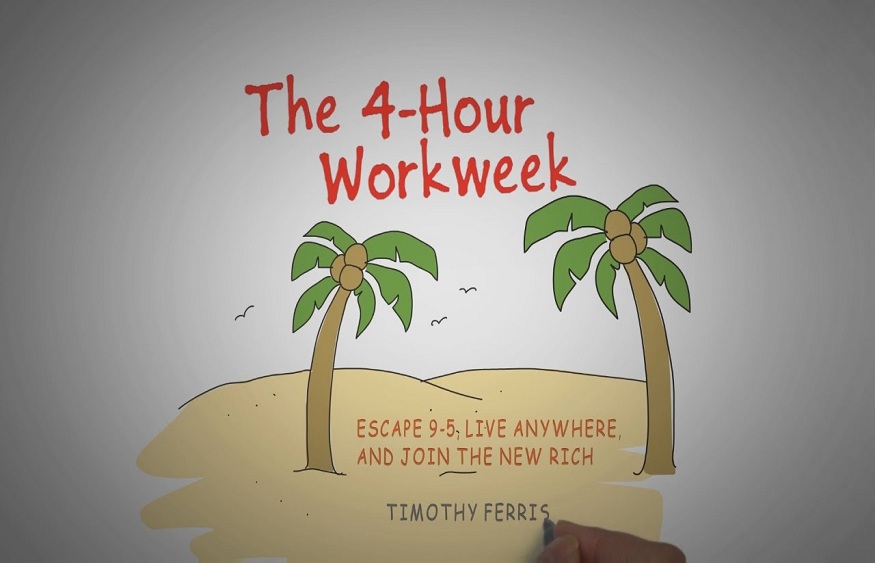The “4-Hour Workweek” by Timothy Ferriss is not just a book; it’s a blueprint for a lifestyle revolution. This groundbreaking guide challenges conventional wisdom about wealth, work, and happiness. Through a four-step process – Redefinition, Elimination, Automation, and Liberation – the book empowers readers to break free from the 9-to-5 grind and start living life on their own terms.
A Short Overview of “The 4-Hour Work Week”
Redefinition: Thinking Differently
The journey begins with a shift in mindset. Ferriss challenges readers to rethink their notions of wealth. It’s not about accumulating vast sums of money; it’s about gaining control over one’s time and mobility.
The book confronts common misconceptions:
Retirement represents a safety net for the unforeseeable future. Our enthusiasm and vitality ebb and flow in cycles. Working efficiently doesn’t equate to idleness. Opportune moments rarely align perfectly. Seeking forgiveness proves more fruitful than seeking approval. Focusing on our strengths outweighs correcting our weaknesses. Abundance can often transform into its opposite. Financial wealth alone does not guarantee fulfilment. Comparing income relative to personal goals takes precedence over raw earnings. While distress is detrimental, embracing eustress can be transformative.
Ferriss acknowledges that fear often paralyzes us when contemplating change. However, he encourages readers to face their fears head-on, exploring both the worst-case scenario and the potential benefits of their decisions.
Elimination: Clearing the Path
Once readers redefine their goals and ambitions, the next step is eliminating obstacles. This entails freeing up time to pursue one’s passions. Ferriss introduces the Pareto principle, which suggests that 80% of results come from 20% of actions. By identifying and focusing on the most productive actions, time management becomes less of a challenge.
Elimination extends beyond time management. It also involves shedding unproductive habits, such as excessive news consumption. The book advocates a five-day hiatus from television and web surfing, revealing that removing unnecessary distractions can liberate an abundance of time.
Automation: Efficiency and Delegation
. Once readers clarify their life goals and remove time-wasting activities, they can begin automating their work processes. This section discusses strategies for creating systems that replace manual labor, ultimately reducing the time required to manage day-to-day tasks.
The book explores various aspects of automation, from hiring virtual assistants to handle administrative tasks to delegating responsibilities. The goal is to minimize one’s direct involvement in routine activities.
Liberation
The last leg of the voyage towards achieving the 4-hour Workweek entails breaking free from the confines of the conventional office setting. Ferriss lays out a five-step strategy for persuading employers to adopt remote work practices:
- Enhance Investment: Advocate for employers to invest more in their employees, making the prospect of losing them financially impractical.
- Validate Enhanced Output: Showcase how remote work can result in heightened productivity and efficiency.
- Highlight Business Advantages: Frame remote work as a boon for the company, emphasizing the benefits it offers to the business.
- Suggest a Trial Period: Initiate a modest trial phase to gauge the feasibility and advantages of remote work.
- Gradual Expansion of Remote Work: Over time, incrementally extend the scope of remote work until it becomes a permanent and integral part of the work culture.
The ultimate goal is to create a work arrangement that allows for more leisure and adventure while maintaining productivity.
Final Words
“The 4-Hour Workweek” is a guide to reimagining life and work. It challenges traditional notions of success, encourages readers to confront their fears, and provides practical steps to achieve greater freedom and fulfilment. A great one for those who love nomadic lifestyle. By redefining, eliminating, automating, and liberating, individuals can embark on a path to a life of purpose and autonomy, where work becomes a means to fund a life filled with meaningful experiences.

